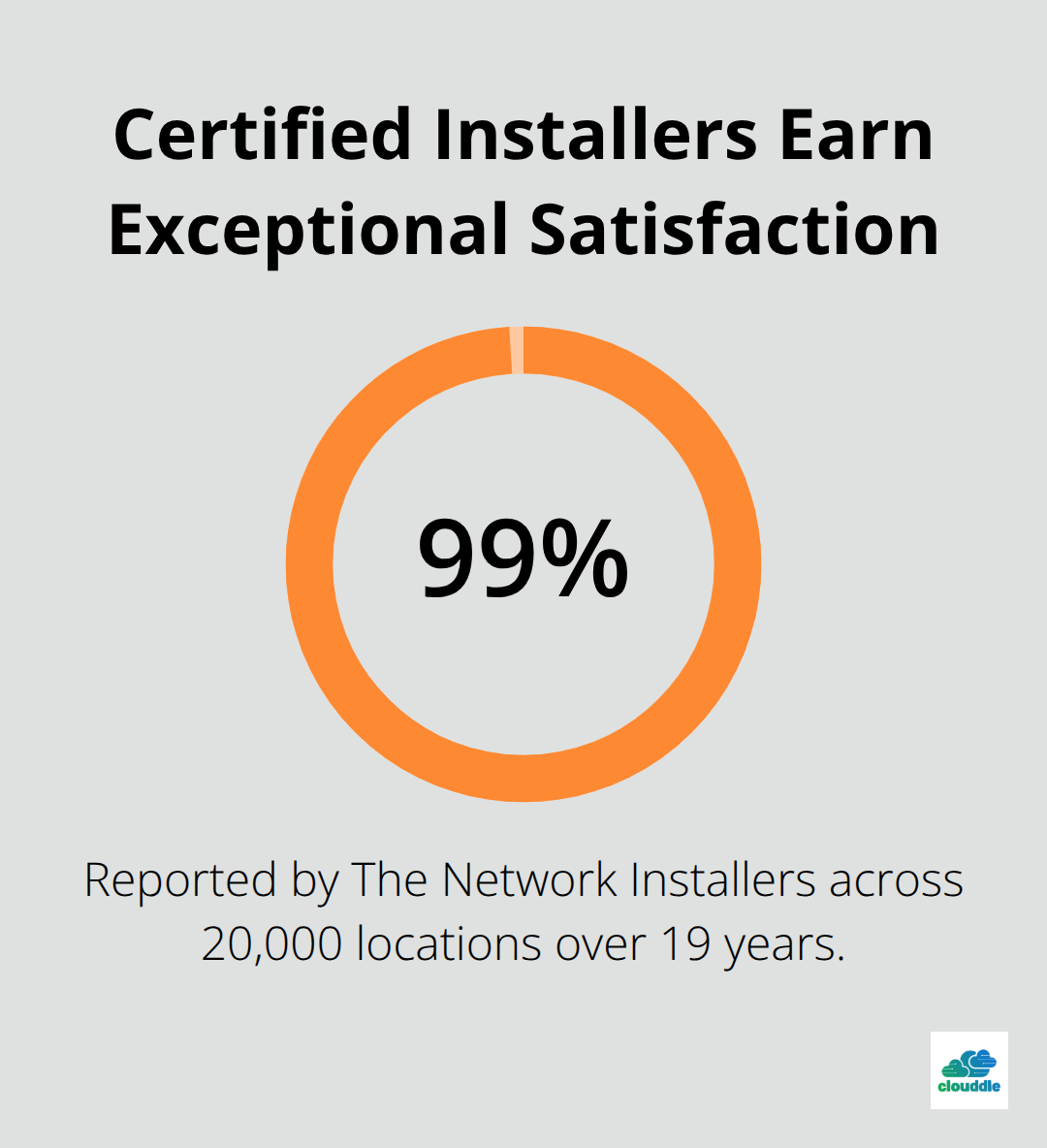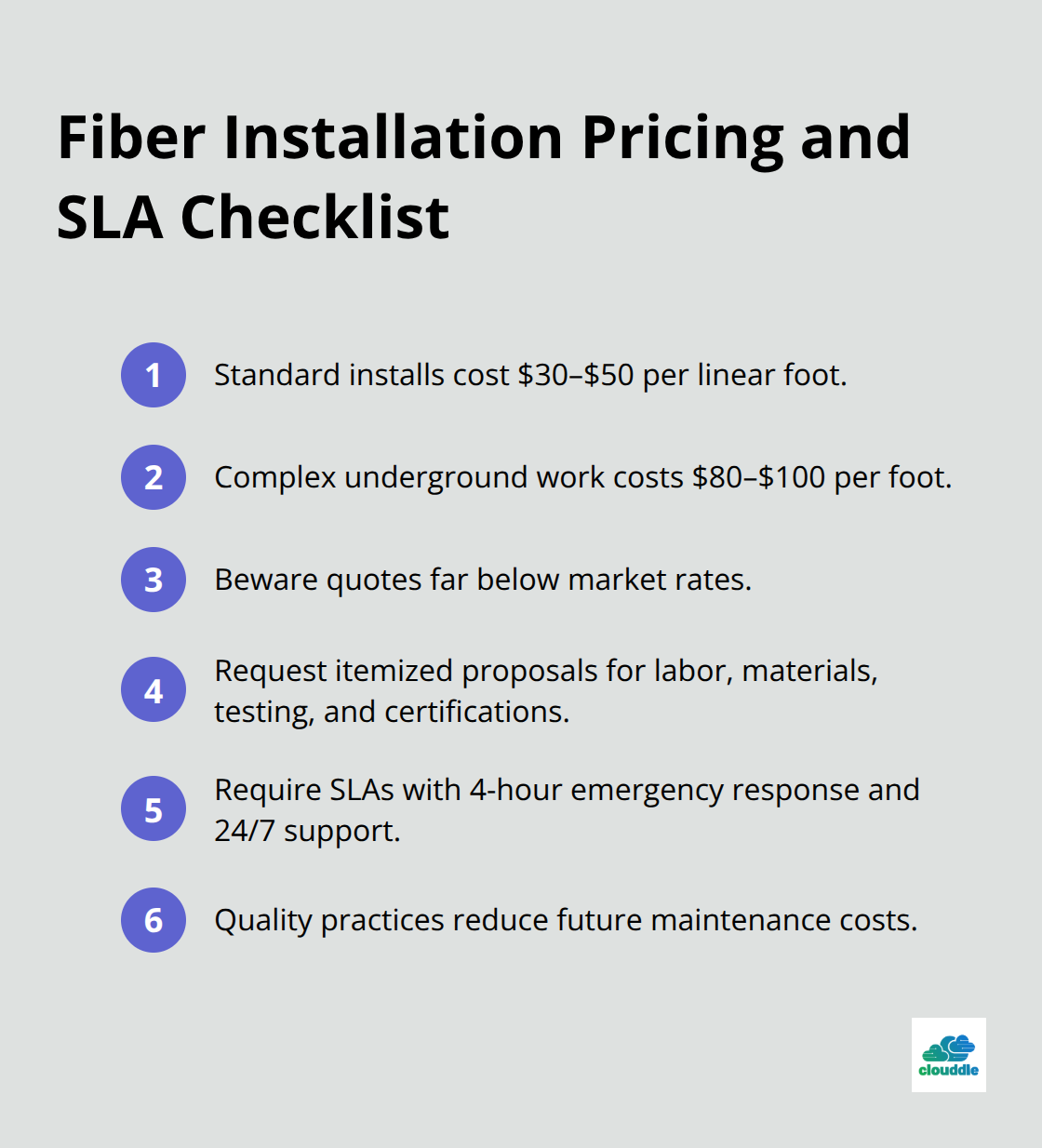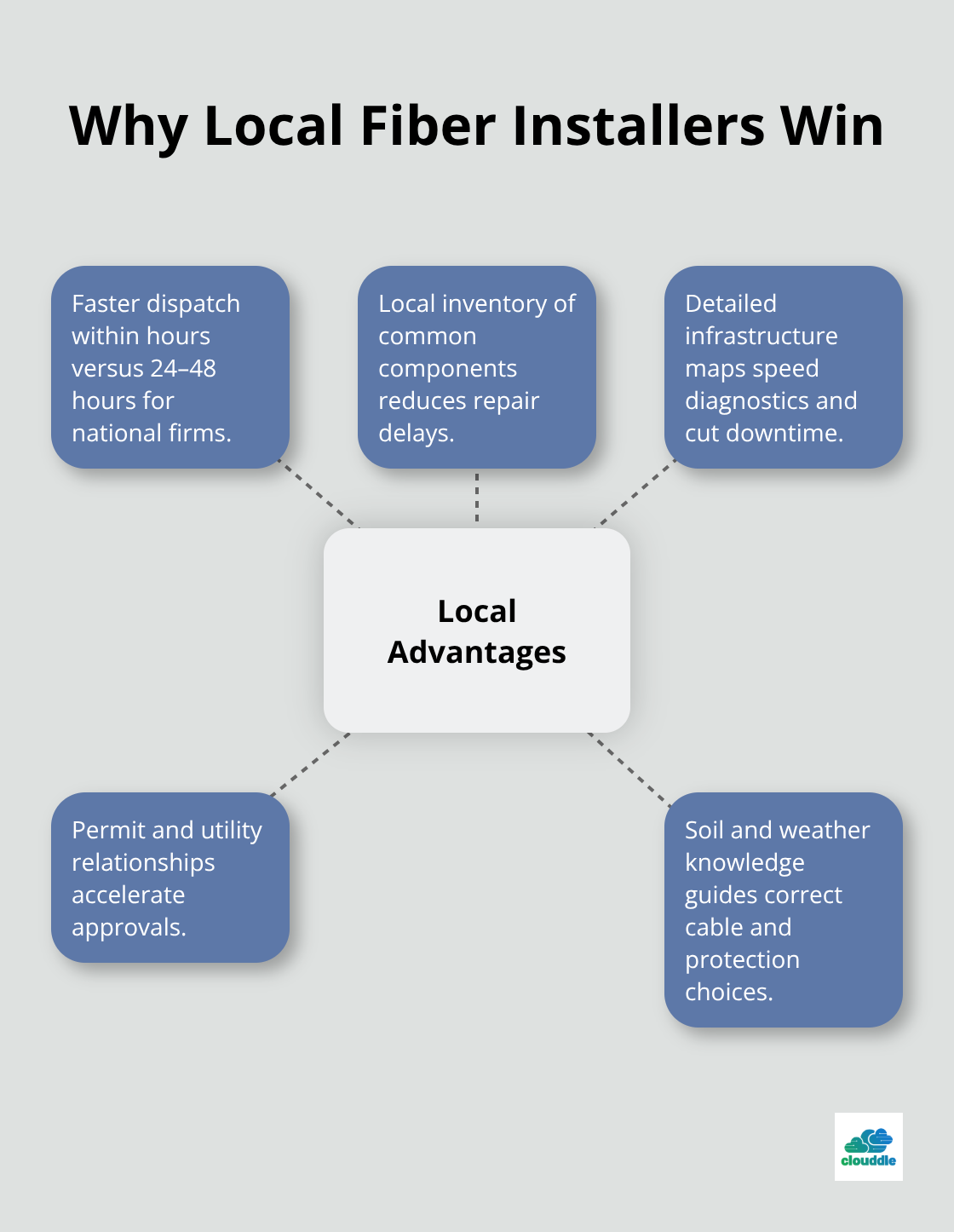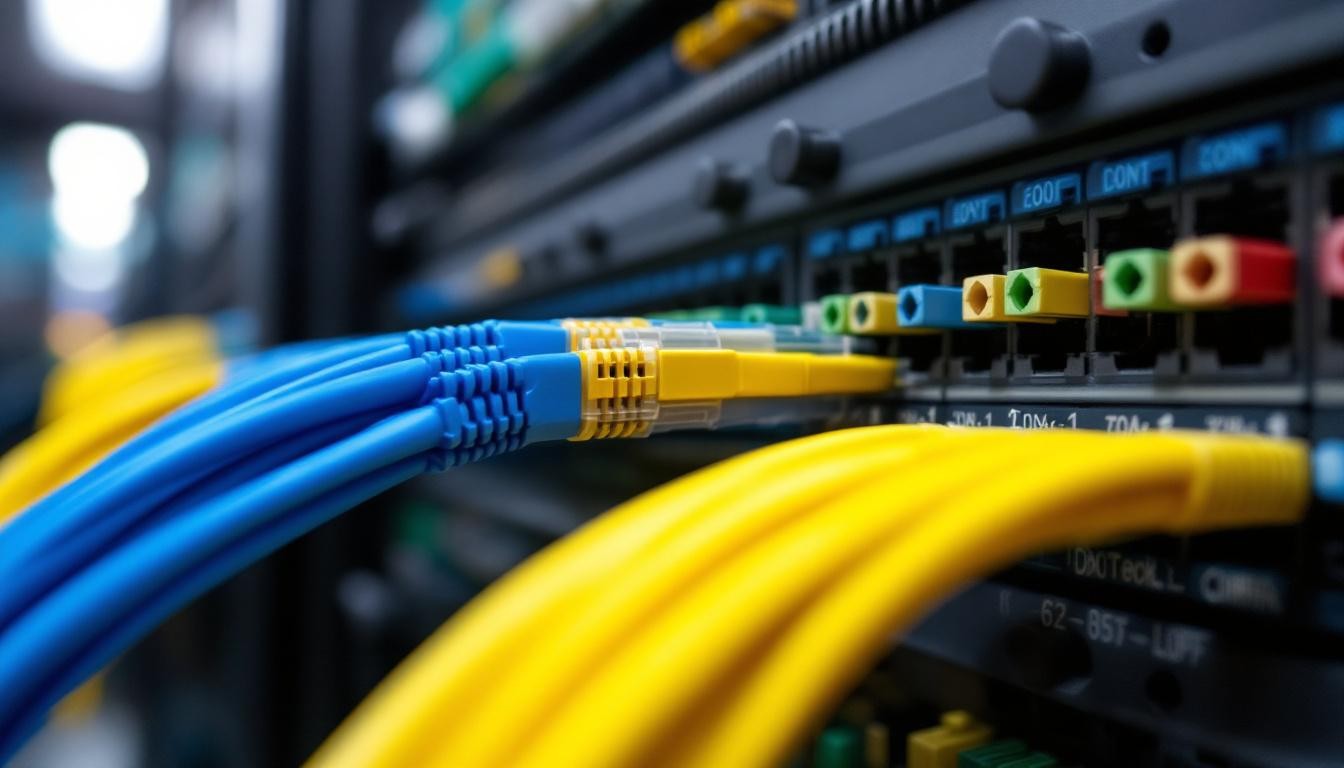Choosing the right fiber optic cable installation companies can make or break your network infrastructure project. Poor installation leads to signal loss, frequent outages, and costly repairs down the line.
We at Clouddle have seen businesses struggle with unreliable contractors who cut corners and deliver subpar results. The key lies in finding experienced local installers who understand your specific requirements and regional regulations.
Which Installation Companies Should You Trust
The fiber optic installation industry splits into two clear categories: certified professionals with proven track records and inexperienced contractors who promise low prices but deliver poor results. Companies with BICSI and CFOT certifications demonstrate technical competence, while those without these credentials often lack the skills needed for complex installations. The Network Installers report 99% customer satisfaction across 20,000 locations over 19 years, which shows what proper certification and experience can achieve.
Certification Requirements That Matter
Look for contractors who hold Corning Fiber Installation and Panduit Certified Technician credentials. These certifications require rigorous training in fusion splicing, OTDR testing, and proper cable handling techniques.

Companies without these specific certifications struggle with critical tasks like maintaining the 10-times-diameter minimum bend radius rule or preventing signal loss during installation. The industry faces growing demand for qualified professionals, making truly qualified installers increasingly valuable.
Service Capabilities Beyond Basic Installation
Top-tier installation companies provide comprehensive testing with OTDR and OLTS equipment, not just basic connectivity checks. They handle both single-mode fiber for long-distance transmission and multimode fiber for building networks, and understand when to use OM1 through OM5 standards for different applications. Companies that offer only basic installation without testing capabilities leave you vulnerable to undetected signal loss that reduces network performance. Professional installers also provide 24/7 emergency support, which becomes essential when fiber cuts cause business downtime that costs thousands per hour.
Local Expertise Advantages
Regional contractors understand specific building codes and permit requirements that national companies often overlook. They respond faster to emergency calls and maintain relationships with local utility companies for smoother installations. Local installers familiar with your area’s soil conditions and weather patterns choose appropriate cable types (like ruggedized fiber for harsh environments or armored cables for industrial settings). This regional knowledge prevents costly mistakes that inexperienced contractors make when they work in unfamiliar territories.
Red Flags to Avoid
Watch out for contractors who quote prices significantly below market rates or promise unrealistic completion timelines. Companies that lack proper insurance coverage or refuse to provide detailed project documentation often cut corners on quality. Installers who cannot explain technical specifications or avoid questions about their certification status typically lack the expertise your project requires. These warning signs help you identify contractors who will create more problems than they solve, which leads directly to the evaluation process for selecting your ideal installation partner.
How Do You Select Your Installation Partner
Start your evaluation by demanding detailed documentation from past projects that match your scale and complexity. Request specific performance metrics like signal loss measurements, testing results, and completion timelines from at least three comparable installations. Companies that provide OTDR test reports, splice loss documentation, and certification records demonstrate transparency and technical competence. Avoid contractors who offer vague references or cannot produce concrete performance data from recent projects.
Pricing Structure Analysis
Professional fiber installers charge between $30-50 per linear foot for standard installations, with costs that rise to $80-100 per foot for complex underground work or challenging terrain. Companies that quote significantly below these market rates typically compromise on materials or skip essential testing procedures. Request itemized proposals that separate labor, materials, testing, and certification costs rather than accept lump-sum bids. Service agreements should include specific response times for maintenance calls, with top-tier providers that offer 4-hour emergency response and 24/7 support availability.

Quality installation practices significantly reduce future maintenance requirements, which makes upfront investment in quality contractors essential for long-term reliability.
Equipment Standards Verification
Demand contractors use fusion splicing equipment from established manufacturers like Fujikura or Sumitomo, not cheaper mechanical splice alternatives that create higher signal loss. Professional installers should own OTDR testing equipment capable of measurement at multiple wavelengths and provide detailed test documentation for every fiber strand. Companies that use outdated or generic testing equipment cannot verify installation quality according to industry standards like TIA-568 or ISO 11801. Verify that contractors stock appropriate cable types (including single-mode OS2 for long runs and OM3/OM4 multimode for building networks), with ruggedized options for harsh environments where transmission losses stay below 0.3dB per kilometer.
Project Timeline Evaluation
Realistic installation schedules vary dramatically based on project complexity and environmental factors. Simple office installations typically require 1-2 days, while complex urban deployments can extend several months due to permit requirements and infrastructure challenges. Contractors who promise unrealistic completion dates often rush critical steps like proper testing or cable protection installation. Evaluate proposed timelines against industry benchmarks and demand detailed project schedules that account for weather delays, permit approval periods, and testing phases. Companies that provide accurate timeline estimates demonstrate project management experience and realistic expectations about installation complexity.
These evaluation criteria help you identify contractors who deliver professional results, but the real advantages emerge when you work with local installation specialists who understand your specific regional requirements.
Why Choose Local Fiber Installers
Local fiber optic installers deliver faster emergency response than national contractors, often reaching sites within hours while larger companies may take 24-48 hours to dispatch technicians. This speed difference can result in significant costs when fiber cuts occur during peak operations, with traffic disruption costs alone reaching $330,000 according to industry studies. Regional installers maintain inventory of common components nearby and understand your area’s infrastructure layout, which allows them to diagnose problems faster and carry appropriate replacement parts. Companies like Multilink with four decades of telecommunications experience show how local expertise translates into superior emergency response capabilities that keep your network operational when problems arise.
Emergency Response Speed
Regional contractors stock replacement components at local warehouses and can reach your site within hours of your service call. National companies must ship parts from distant distribution centers, which adds days to repair timelines. Local installers also maintain detailed maps of your area’s fiber infrastructure and know exactly where cables run through buildings or underground conduits. This knowledge eliminates the time-consuming detective work that outside contractors face when they arrive at unfamiliar locations.

Regional Compliance Expertise
Local contractors navigate municipal permit processes that can delay projects by weeks when handled incorrectly. They maintain relationships with utility companies and understand specific soil conditions that affect underground installations, which prevents costly mistakes that inexperienced installers make. Regional specialists know which areas require special environmental permits and can expedite approval processes through established connections with local authorities. This knowledge becomes essential when installations cross multiple jurisdictions or require coordination with existing infrastructure (like shared utility poles or underground conduits).
Direct Communication Benefits
Local installers provide direct access to project managers and technical staff who make installation decisions on-site. Regional companies assign dedicated account representatives who understand your specific business requirements and can modify installation plans quickly when circumstances change. This personalized approach contrasts sharply with national companies where communication flows through multiple layers of management, which creates delays and miscommunication. Local installers also provide detailed project documentation and test results directly to your technical team, which maintains transparency throughout the installation process that larger companies often cannot match due to bureaucratic structures.
Cost Structure Advantages
Regional installers often charge lower overhead costs since they operate without expensive national advertising campaigns or corporate management layers. They quote competitive rates for standard installations ($30-50 per linear foot) while maintaining quality standards through local reputation requirements. Local companies also offer flexible payment terms and can adjust project scopes more easily than national contractors bound by rigid corporate policies.
Final Thoughts
Fiber optic cable installation companies with proper certifications deliver networks that operate reliably for decades without frequent repairs. Companies with BICSI and CFOT credentials use fusion splicing techniques and maintain bend radius requirements that prevent signal loss. Professional installers provide detailed OTDR test documentation that verifies installation integrity and protects your investment.
Local contractors respond to emergencies within hours while national companies take days to dispatch technicians. Regional specialists understand permit requirements and soil conditions that affect underground installations. They stock replacement components nearby and maintain detailed infrastructure maps that eliminate diagnostic delays.
Quality installation prevents network downtime that costs businesses thousands per hour during peak operations. Professional contractors charge competitive rates ($30-50 per linear foot) while maintaining standards that reduce long-term maintenance requirements. Clouddle provides comprehensive technology solutions with 24/7 customer assistance and flexible contracts that deliver cutting-edge connectivity solutions for business growth.


